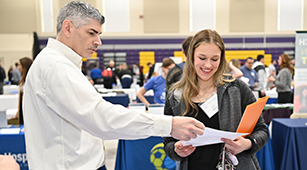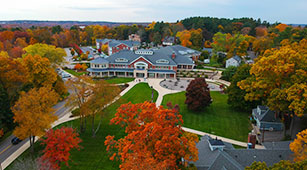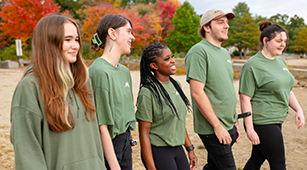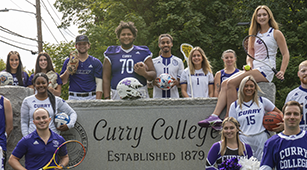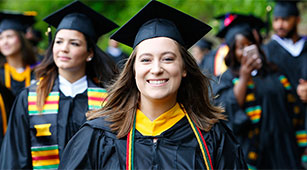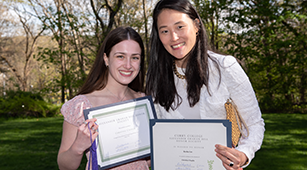Schedule an appointment to meet with Career & Experiential Learning about your area of interest.
Make an Appointment
When asked about how she came to choose a career as a forensic entomologist, Curry Department of Natural Sciences and Mathematics assistant professor Samantha “Sam” Sawyer offers a simple explanation.
"I’m a product of the CSI effect,” she says. “[In high school] I went into biotech knowing I wanted to do forensics. I just didn’t know exactly what I wanted to do yet.”
As part of a science fair project requirement in the biotechnology program at Assabet Valley, a vocational high school in Massachusetts, Sawyer and a classmate watched a pig’s head decompose. She admits that “at first I was really grossed out by all the insects,” but quickly became enthralled by the diversity of the community, the varieties of beetles and flies, and the slugs involved in the decomposition process.
“It was at that point when I made my little insect collection,” Sawyer recalls, “that I knew I was going to do this for the rest of my life.”
As a sophomore at Bridgewater State University, not far from her hometown of Marlborough, Massachusetts, Sawyer landed an undergraduate research position tracking predators at Duxbury Beach, with a focus on coyotes. Further inquiry allowed Sawyer to explore a growing interest in entomology — specifically the study of the role of insects in decomposition that she had discovered in high school. Her primary undergraduate research was observing decomposition, and looking at whether the soil arthropods that lived in the leaf litter were being affected by it. She published her findings in 2020 in Ecological Entomology, and presented a poster on the work in 2016 at the International Congress of Entomology, the field’s biggest gathering. That’s where Sawyer met Professor Jeffery Tomberlin, the entomologist who would eventually become her Ph.D. advisor at Texas A&M.
As a doctoral student, Sawyer’s research focused for two years on mass mortality events, and the ecological impact of multiple-casualty incidents (such as genocides and natural disasters). The second major project for her doctoral work involved looking at carcass consumption of small remains and how wildlife impacted insect colonization. Those findings were published in Ecosphere in 2022.
“By the time I was leaving,” says Sawyer, who also served as a postdoctoral researcher at the University of Florida in the Emerging Pathogens Institute and the Department of Geography, “there was this really complex story about how vertebrate scavengers are interacting with remains that change the outcome of arthropod communities.”
Today, Sawyer holds the distinction of being the only board-certified forensic entomologist in New England. She continues to confer on cases involving forensic entomology, working as an expert consultant to law enforcement agencies, medical examiners, and veterinarians. Her investigative work offers key timeline information through insect evidence in cases of neglect, abuse, and unattended/suspicious death. Since last fall, she has been sharing that expertise with her students at Curry.
In her first year on the faculty, Sawyer taught Introduction to Organisms, Advanced Case Investigations, Forensic Entomology, and Introduction to the Forensic Sciences. According to the professor, her students perform a series of presumptive testing, which teaches them to weed out the less significant or nonspecific samples they’re targeting. In the forensic class, students perform an actual rodent necropsy in lieu of a traditional dissection, which simulates the process of a pathologist or a forensic veterinarian.
“Many students come in not knowing what type of forensic scientist they want to be or thinking they will become homicide detectives or CSIs, but I’m helping them chart their course,” Sawyer explains. “You want them to learn early on what they really like and what they don’t like about the field. Giving them that knowledge allows them to reevaluate their own trajectories. At the end of the semester in the introductory course, I gave them what’s called the ‘sorting hat’ [a la Harry Potter]. They answer questions that are either affirming or they discover there’s a field they never considered exploring that they’re now going to look into.”
Sawyer also has been able to use the Curry campus as an extension of her D.E.A.T.H. (Decomposition and Theoretical) Ecology Lab, including working with her students to conduct surveys of what species of flies are found on campus and using cameras to identify local wildlife (so far that has included fisher cats, coyotes, turkeys, deer, and a bobcat, among others).
“The whole idea is getting a general understanding of who is on campus and what parts of the wetland they’re using,” Sawyer says. “We have a hiking trail on the south side of campus that serves as an animal refuge area. Understanding where they are, we can then start putting remains out and looking at who’s accessing those remains so we can now ask those ecological questions about how our ecosystem is functioning.”
